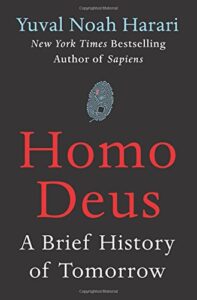
Homo Deus: A Brief History of Tomorrow
By Yuval Noah Harari
448 pages
Originally published in 2015
The first book of Harari’s that I read was Sapiens. I loved it. It’s one of those books that gives pleasure on almost every page. And there are 448 pages. In it, Harari takes readers on a tour of the history of Homo sapiens (intelligent humans), divided into four periods:
- The Cognitive Revolution (c. 70,000 BCE, when imagination evolved in Homo sapiens)
- The Agricultural Revolution (c. 10,000 BCE, the development of agriculture)
- The Unification of Humankind (c. 34 CE, the gradual consolidation of political organizations towards one global empire)
- The Scientific Revolution (c. 1543 CE, the emergence of objective science)
I next read Harari’s 21 Lessons for the 21st Century, which seems to be a collection of clever but somewhat random ideas he had about the state of the world that he wanted to get down on paper. That book was solid, but not great.
With Homo Deus, Harari is back to his strength. As the subtitle cleverly suggests, it is a wide-ranging commentary about all the amazing things that are happening today, with a brief history of how they came about (mostly taken from Sapiens) and a look at what they will look like in the future. And “the future,” as he reminds us, could be next month.
His central argument is that it took millions of years for apes to evolve into Homo sapiens via the tedious mechanism of evolution through natural selection, and that has changed. Natural selection is being replaced by machine learning, AI, and other forms of intelligent design that are much faster (and become geometrically faster every year). Homo sapiens’ next stage of development – the “Homo deus” of the title – will be taking on the characteristics that traditional societies attributed to gods.
With the recent developments in AI technology, this book couldn’t be a more timely read. A question it is trying to answer: What effect will it have on the world?
For example:
* What will happen to democracy when Google and Facebook come to know our likes and our political preferences better than we know them ourselves?
* What will happen to the welfare state when computers push humans out of the job market and create a massive new “useless class”?
* Will Silicon Valley end up producing new religions, rather than just novel gadgets?
Critical Reception
I didn’t know this when I read Sapiens, but Harari is generally thought poorly of in academic circles. In preparing this review, I read a few such critiques and they were sort of obnoxiously dismissive.
For example, from Christopher Robert Halpike on Sapiens in 2020: “One has often had to point out how surprisingly little [Harari] seems to have read on quite a number of essential topics. It would be fair to say that whenever his facts are broadly correct they are not new, and whenever he tries to strike out on his own he often gets things wrong, sometimes seriously.”
And on July 22, 2022, Current Affairs published “The Dangerous Populist Science of Yuval Noah Harari,” an article arguing that his books were short on scientific proof: “The bestselling author is a gifted storyteller and popular speaker. But he sacrifices science for sensationalism, and his work is riddled with error.”
Here’s What I Think
Academics don’t like Harari because he understands and exposes their game of branding ideas that don’t support their leftist views as unscientific and factually inaccurate. What they really mean is: “Don’t even bother to read Harari. You may find him interesting, but his books will damage you. And you and your children will stop believing in all the bullshit we’ve been paid to teach and write about.”
About Yuval Noah Harari

Yuval Noah Harari is a historian, philosopher, and bestselling author. (His books have sold 45 million copies in 65 languages.) Currently a professor in the Department of History at the Hebrew University of Jerusalem, he is considered one of the world’s most influential public intellectuals.
Click here to watch him speaking about Homo Deus.
